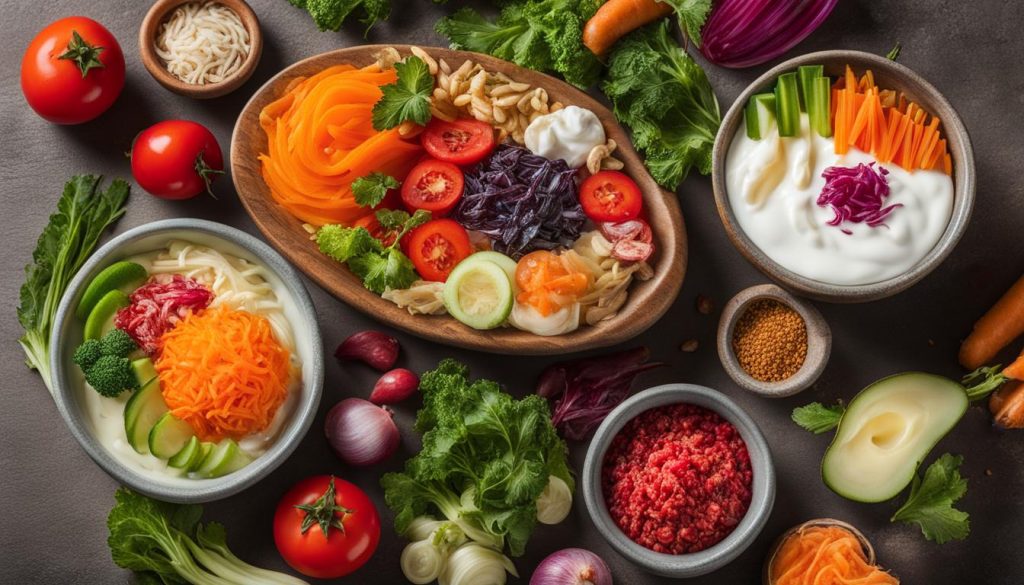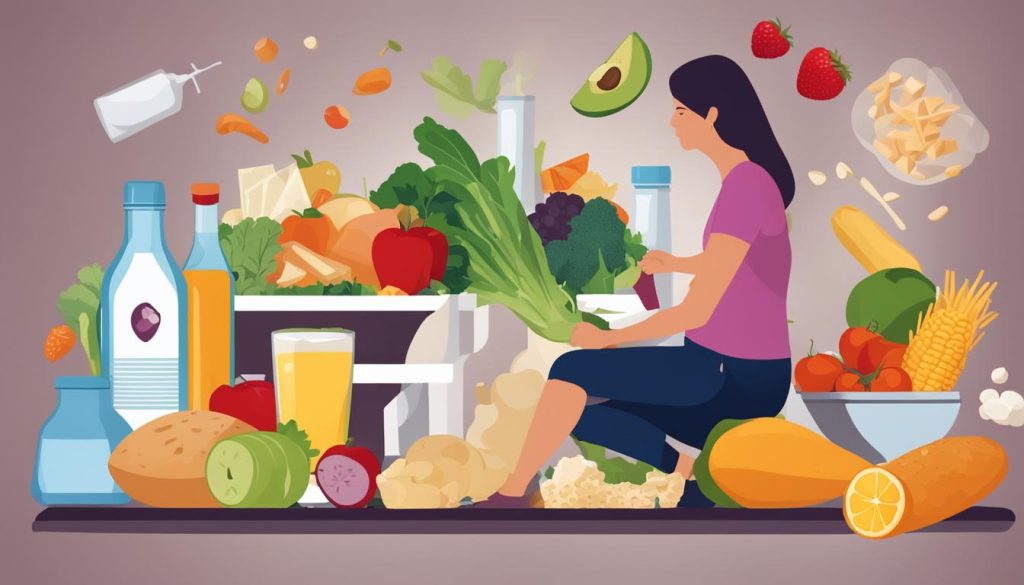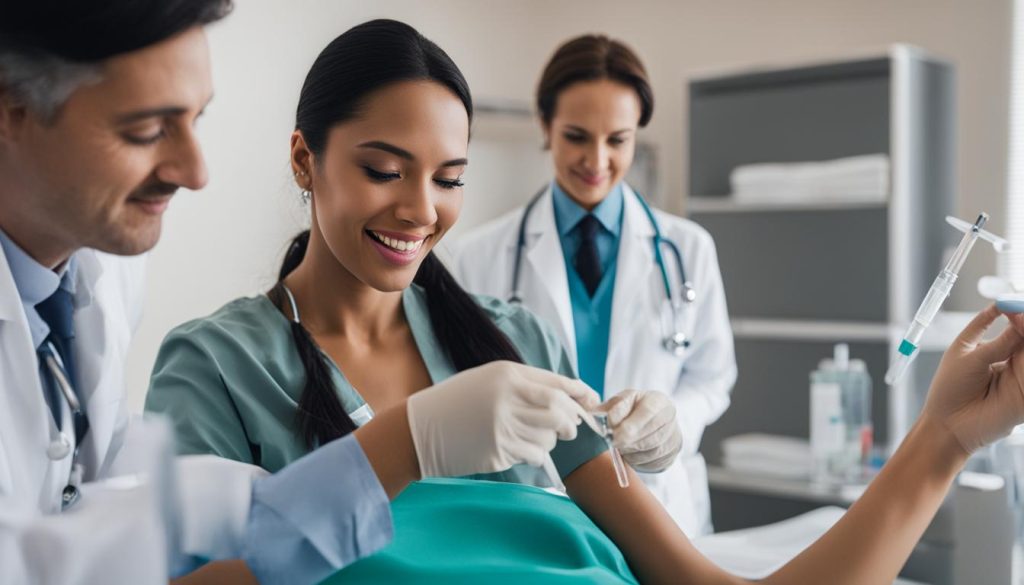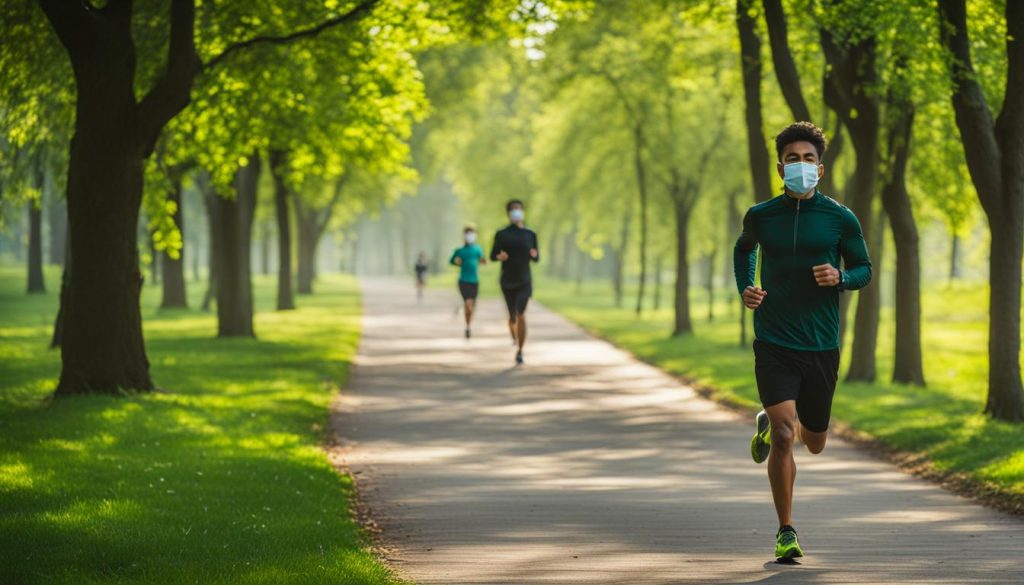Kidney cancer is a serious and potentially life-threatening disease. However, there are steps you can take to reduce your risk and prevent kidney cancer. By implementing certain lifestyle habits and making changes to your diet, you can lower your risk of developing this type of cancer. Early detection of kidney cancer is also crucial for better treatment outcomes. In this article, I will guide you through the process of preventing kidney cancer and provide you with valuable tips and information.
Key Takeaways:
- Understand the risk factors associated with kidney cancer
- Adopt healthy lifestyle habits, such as quitting smoking and maintaining a healthy weight
- Incorporate kidney-supportive foods into your diet
- Regular check-ups and early detection play a crucial role in preventing kidney cancer
- Avoid harmful substances, such as excessive use of pain relievers and exposure to toxins
Understanding Kidney Cancer Risk Factors
When it comes to kidney cancer, there are several risk factors that you need to be aware of. Understanding these risk factors is essential for kidney health and cancer prevention. By identifying and mitigating these factors, you can significantly lower your risk of developing kidney cancer.
Age and Gender
One of the primary risk factors for kidney cancer is age. The risk increases as you get older, with the majority of cases occurring in people over the age of 60. Additionally, men are more likely to develop kidney cancer compared to women.
Family History and Genetic Conditions
If you have a family history of kidney cancer, your risk of developing the disease may be higher. Certain genetic conditions, such as von Hippel-Lindau disease, hereditary papillary renal cell carcinoma, and hereditary leiomyomatosis, also increase the risk.
Exposure to Chemicals and Toxins
Exposure to certain chemicals and toxins, such as asbestos, cadmium, benzene, and organic solvents, can contribute to the development of kidney cancer. Occupational exposure to these substances puts individuals at higher risk.
| Risk Factors | Description |
|---|---|
| Smoking | Smokers have a higher risk of kidney cancer compared to non-smokers. |
| Obesity | Being overweight or obese increases the risk of developing kidney cancer. |
| High Blood Pressure | Individuals with high blood pressure have an increased risk of kidney cancer. |
| Chronic Kidney Disease | Having chronic kidney disease can elevate the risk of developing kidney cancer. |
Smoking, Obesity, and High Blood Pressure
Smoking is a significant risk factor for kidney cancer, with smokers having a higher risk compared to non-smokers. Obesity and high blood pressure also increase the risk of developing kidney cancer. These risk factors emphasize the importance of maintaining a healthy lifestyle and managing chronic conditions to lower the risk of kidney cancer.
Lifestyle Habits for Kidney Cancer Prevention
To reduce the risk of kidney cancer, there are certain lifestyle habits you can adopt. These natural ways of preventing kidney cancer can not only lower your risk but also improve your overall health and well-being.
Quit Smoking
One of the most important steps you can take to prevent kidney cancer is to quit smoking. Smoking is a significant risk factor for not only lung cancer but also kidney cancer. By quitting smoking, you can significantly reduce your risk and improve your overall health.
Maintain a Healthy Weight
Obesity is also linked to an increased risk of kidney cancer. By maintaining a healthy weight through regular exercise and a balanced diet, you can lower your risk. Aim to incorporate physical activity into your daily routine and make healthier food choices to achieve and maintain a healthy weight.
Eat a Balanced Diet
Consuming a balanced diet is crucial for kidney cancer prevention. Focus on incorporating plenty of fruits and vegetables into your meals. These foods are rich in vitamins, minerals, and antioxidants that can help protect your kidneys and reduce the risk of cancer. Avoid processed foods and excessive sugar intake, as these can contribute to inflammation and increase the risk of cancer.
Stay Hydrated
Drinking an adequate amount of water is essential for kidney health and cancer prevention. Water helps flush out toxins and waste products from the body, reducing the burden on your kidneys. Aim to drink at least 8 glasses of water per day to stay properly hydrated.
By adopting these lifestyle habits, you can take proactive steps towards preventing kidney cancer and promoting optimal kidney health. Remember, prevention is key, and making these changes can have a significant impact on your overall well-being.
Dietary Recommendations for Kidney Cancer Prevention
When it comes to preventing kidney cancer, your diet plays a crucial role. Certain foods have been found to support kidney health and reduce the risk of cancer. Including these kidney-supportive foods in your diet can provide you with essential nutrients and antioxidants that help protect your kidneys.
To promote kidney cancer prevention, it is recommended to incorporate the following foods into your daily meals:
| Food | Description |
|---|---|
| Watermelon | Rich in water content and contains lycopene, a powerful antioxidant that may help fight cancer. |
| Cranberries | Contain compounds that can help prevent bacteria from adhering to the bladder and urethra, reducing the risk of urinary tract infections. |
| Onions | Contain flavonoids that have been associated with a lower risk of certain cancers, including kidney cancer. |
| Olive Oil | A healthy source of monounsaturated fats, which may help reduce inflammation and promote heart health. |
| Blueberries and Strawberries | Rich in antioxidants, which can help protect cells from damage caused by free radicals. |
| Cauliflower | Contains compounds that may help prevent the growth of cancer cells and support detoxification processes. |
| Peppers | High in vitamin C and other antioxidants, which can help reduce the risk of chronic diseases, including cancer. |
| Garlic | Contains organosulfur compounds that have been shown to have anti-cancer effects. |
Incorporating these foods into your diet can provide a variety of health benefits, including kidney cancer prevention. Remember to maintain a balanced and varied diet to ensure that you’re getting all the necessary nutrients for overall well-being.
Importance of Early Detection
Early detection of kidney cancer is crucial for better treatment outcomes and increased chances of a cure. Regular check-ups with your healthcare provider, including physical examinations and screenings, can help in identifying any potential signs or symptoms of kidney cancer at an early stage. Diagnostic tests, such as imaging scans and urine tests, may be recommended to evaluate the health of your kidneys and detect any abnormalities. If you experience any unusual symptoms or have risk factors for kidney cancer, it is important to seek medical attention promptly.
Early detection plays a vital role in successful treatment outcomes of kidney cancer. By detecting the disease at an early stage, treatment options are often more effective and less invasive. Regular check-ups with your healthcare provider are essential for monitoring your kidney health and identifying any potential concerns. During physical examinations, your healthcare provider may palpate your abdomen to check for any abnormal growths or masses. Additionally, they may recommend diagnostic tests, such as ultrasound, CT scan, or MRI, to evaluate the health of your kidneys and detect any signs of cancer.
In addition to physical examinations and imaging tests, urine tests can also aid in the early detection of kidney cancer. These tests can analyze the presence of blood or certain substances in your urine that may indicate the presence of cancerous cells or tumors in your kidneys. If any abnormalities are detected, further diagnostic tests, such as a biopsy, may be recommended to confirm the diagnosis and determine the appropriate treatment plan.
Table: Symptoms of Kidney Cancer
| Symptoms | Description |
|---|---|
| Blood in urine (hematuria) | Visible or microscopic blood in urine |
| Back pain or side pain | Persistent pain in the back or side |
| Persistent fatigue | Feeling tired and weak all the time |
| Unexplained weight loss | Significant weight loss without a known cause |
| Loss of appetite | Decreased desire to eat or loss of hunger |
If you experience any of these symptoms or have any concerns about your kidney health, it is important to consult with a healthcare professional. They can evaluate your specific situation and recommend appropriate tests or further investigations if necessary. Remember, early detection of kidney cancer can significantly improve treatment outcomes and increase the chances of a successful recovery.
Managing Kidney Health
Taking care of your kidneys is essential for overall health and cancer prevention. By implementing simple lifestyle habits, you can support the health of your kidneys and reduce the risk of kidney cancer.
One of the key ways to manage kidney health is by staying properly hydrated. Drinking an adequate amount of water helps flush out toxins and waste materials from your body, relieving the burden on your kidneys. Aim to drink at least 8 cups of water per day to maintain optimal kidney function.
Another important aspect of kidney health is avoiding excessive consumption of alcohol and sugary beverages. Alcohol can be harmful to your kidneys and long-term excessive consumption increases the risk of developing kidney disease. Similarly, sugary beverages can contribute to weight gain and high blood sugar levels, which are risk factors for kidney cancer.
| Dos | Don’ts |
|---|---|
| Do drink adequate amounts of water to stay hydrated | Don’t consume excessive amounts of alcohol |
| Do limit your intake of sugary beverages | Don’t rely on energy drinks or soda as your primary source of hydration |
| Do opt for healthier alternatives like herbal tea or infused water | Don’t consume excessive amounts of caffeine, as it can dehydrate the body |
In addition to hydration, managing your blood pressure and blood sugar levels is crucial for kidney health. High blood pressure and diabetes are significant risk factors for kidney cancer. By monitoring and controlling these conditions through regular check-ups, prescribed medications, a healthy diet, regular exercise, and maintaining a healthy weight, you can reduce your risk of developing kidney cancer.
Lastly, abstaining from smoking and limiting the use of pain relievers is important for kidney health. Smoking damages blood vessels, reduces blood flow to the kidneys, and increases the risk of kidney cancer. Pain relievers, such as nonsteroidal anti-inflammatory drugs (NSAIDs), can be hard on the kidneys when used excessively. It is important to follow the recommended dosage and consult with your healthcare provider if you have any concerns.
By adopting these healthy habits, you can take control of your kidney health and reduce the risk of kidney cancer. Remember, prevention is key, and taking proactive steps now can have long-term benefits for your overall well-being.

Probiotics and Kidney Health
When it comes to kidney health and cancer prevention, incorporating probiotics into your lifestyle can have significant benefits. Probiotics are beneficial bacteria that can support the overall health of your kidneys and digestive system. A clinical trial conducted with chronic kidney disease patients found that taking probiotics improved kidney function test scores and enhanced the overall quality of life.
There are various ways to include probiotics in your diet. Foods such as yogurt, kefir, sauerkraut, and kimchi are rich sources of probiotics. By incorporating these probiotic-rich foods into your daily meals or opting for probiotic supplements, you can promote the proper processing of waste materials by your kidneys and maintain a healthy digestive system.
Probiotics work by restoring the natural balance of bacteria in your gut, which plays a critical role in maintaining the overall health of your body. A healthy gut microbiome can help reduce inflammation, strengthen your immune system, and improve nutrient absorption. By supporting kidney health through probiotics, you are taking proactive steps towards preventing kidney cancer and maintaining optimal well-being.
| Probiotic-Rich Foods | Benefits |
|---|---|
| Yogurt | Contains live cultures of beneficial bacteria that support gut health |
| Kefir | A fermented milk drink packed with probiotics and essential nutrients |
| Sauerkraut | Fermented cabbage that provides probiotics and fiber for a healthy gut |
| Kimchi | A spicy Korean side dish made from fermented vegetables, rich in probiotics and antioxidants |
By embracing probiotics as part of your kidney health and cancer prevention strategy, you are nurturing your kidneys and promoting overall well-being. Remember to consult with your healthcare provider before making any significant dietary changes or incorporating supplements into your routine.

Natural Detoxification Methods
In my journey to prevent kidney cancer, I have discovered the importance of supporting the detoxification of my body, including my kidneys. By implementing natural detoxification methods, I have been able to give my kidneys a boost and improve my overall health. One effective method I have found is bathing in Epsom salts. Epsom salts help remove waste and toxins from the body, providing a rejuvenating experience for the kidneys. To enjoy the benefits, simply dissolve Epsom salts in warm bathwater and soak for 20-30 minutes. This soothing ritual not only supports kidney health but also promotes relaxation and stress relief.
Another natural detoxification method I have incorporated into my routine is the consumption of cilantro. Cilantro is known for its ability to assist in detoxification. I like to juice cilantro with water, lemon juice, and honey to create a refreshing detoxifying drink. The combination of these ingredients helps eliminate toxins from the body, supporting kidney health and preventing the development of kidney cancer. If juicing is not your preference, you can also consider incorporating cilantro into your meals. Adding fresh cilantro to salads or using it as a garnish can still provide the detoxification benefits.
Risk Factor Comparison
| Risk Factors | Kidney Cancer | Detoxification Methods |
|---|---|---|
| Exposure to toxins | Increases risk | Epsom salt baths, cilantro detox drink |
| Smoking | Increases risk | Epsom salt baths, cilantro detox drink |
| Excessive alcohol consumption | Increases risk | Epsom salt baths, cilantro detox drink |
| High blood pressure | Increases risk | Epsom salt baths, cilantro detox drink |
| Obesity | Increases risk | Epsom salt baths, cilantro detox drink |
By incorporating these natural detoxification methods into my lifestyle, I have taken proactive steps to prevent kidney cancer. It is important to note that while these methods can support kidney health and reduce the risk of cancer, they should not replace regular check-ups and screenings with healthcare providers. Early detection is key to successful treatment outcomes. Therefore, I encourage everyone to prioritize their kidney health and make the necessary changes to prevent kidney cancer.

Tips for Lowering the Risk of Kidney Cancer
Preventing kidney cancer is a priority for maintaining good health. By incorporating certain tips into your lifestyle, you can significantly lower your risk and promote kidney health. Here are some important strategies:
Maintain a Healthy Weight
One of the key factors in preventing kidney cancer is maintaining a healthy weight. Obesity has been linked to an increased risk of kidney cancer, so it’s important to manage your weight through a balanced diet and regular exercise. Focus on consuming nutrient-dense foods and limiting processed and high-sugar foods to support your overall health and reduce the risk of kidney cancer.
Control Blood Pressure and Blood Sugar
High blood pressure and diabetes are significant risk factors for kidney cancer. By controlling your blood pressure and blood sugar levels, you can effectively lower your risk. Monitor your blood pressure regularly, follow a healthy diet, engage in regular physical activity, and take prescribed medications as directed. Ensuring your blood sugar levels are well-managed through a balanced diet and exercise is also crucial for kidney cancer prevention.
Avoid Harmful Substances
Avoiding exposure to harmful substances can greatly reduce your risk of kidney cancer. Minimize your exposure to chemicals and pollutants, whether in the workplace or at home. Additionally, limit the use of pain relievers, as they can be hard on the kidneys and contribute to the development of kidney cancer. Quitting smoking and limiting alcohol consumption are also essential steps for protecting your kidneys and lowering the risk of cancer.
Controlling Blood Pressure and Blood Sugar
Controlling your blood pressure and blood sugar levels is crucial for maintaining kidney health and lowering the risk of kidney cancer. High blood pressure and diabetes are significant risk factors for this type of cancer, and managing these conditions can help prevent its development.
To control blood pressure, it is important to monitor your levels regularly and follow your healthcare provider’s recommendations. This may include taking prescribed medications, adopting a healthy diet low in sodium and saturated fats, engaging in regular physical activity, and managing stress levels. By keeping your blood pressure within a healthy range, you can reduce the strain on your kidneys and lower the risk of kidney cancer.
Similarly, managing blood sugar levels is essential for preventing kidney cancer. If you have diabetes, it is crucial to work closely with your healthcare team to monitor and control your blood sugar levels through medication, diet, and exercise. Keeping your blood sugar within a target range can help protect your kidneys and reduce the risk of kidney cancer.
By actively controlling both blood pressure and blood sugar, you can take important steps towards preserving kidney health and minimizing the risk of developing kidney cancer.

Avoiding Harmful Substances
When it comes to preventing kidney cancer, it is essential to avoid exposing yourself to harmful substances that can increase the risk of this disease. Chemicals and pollutants, whether in the workplace or in your everyday environment, can have detrimental effects on your kidneys and contribute to the development of kidney cancer. Taking precautions to minimize your exposure to these toxins is crucial for lowering the risk.
Another harmful substance to avoid is excessive use of pain relievers. While these medications can provide temporary relief, prolonged or excessive use can put a strain on your kidneys and potentially lead to kidney cancer. It is important to use pain relievers responsibly and only as directed by your healthcare provider.
Furthermore, smoking and excessive alcohol consumption are both known to have negative impacts on kidney health and increase the risk of kidney cancer. Quitting smoking and reducing alcohol intake are important steps you can take to protect your kidneys and lower the risk of developing this disease.
Avoiding Harmful Substances: Summary
Avoiding harmful substances is a critical aspect of kidney cancer prevention. This includes minimizing exposure to chemicals and pollutants, using pain relievers responsibly, quitting smoking, and reducing alcohol consumption. By taking these precautions, you can significantly lower your risk and prioritize the health of your kidneys. Remember, prevention is key when it comes to kidney cancer, and making conscious choices to avoid harmful substances is an important part of that prevention journey.
Conclusion
Taking proactive steps to prevent kidney cancer is crucial for maintaining optimal health and well-being. By making lifestyle changes and staying vigilant about potential risk factors, you can significantly reduce your risk of developing this disease. Remember, prevention is key, and early detection plays a vital role in successful treatment outcomes.
Start by adopting a healthy lifestyle, which includes a nutritious diet, regular exercise, and stress management. A balanced diet with plenty of fruits and vegetables, along with staying hydrated and limiting alcohol consumption, can go a long way in preventing kidney cancer.
Additionally, it’s important to stay on top of any potential risk factors or abnormalities through regular check-ups with your healthcare provider. By monitoring your kidney health and addressing any concerns promptly, you can take proactive measures to prevent kidney cancer.
By taking charge of your kidney health and implementing these tips for preventing kidney cancer, you are investing in your overall well-being and reducing your risk of this potentially life-threatening disease.
FAQ
What are the risk factors for kidney cancer?
Risk factors for kidney cancer include age, gender, family history, genetic conditions, exposure to certain chemicals, smoking, obesity, high blood pressure, and chronic kidney disease.
How can I prevent kidney cancer?
You can prevent kidney cancer by adopting healthy lifestyle habits, such as quitting smoking, maintaining a healthy weight, staying active, eating a balanced diet, staying hydrated, limiting alcohol consumption, managing stress levels, and getting regular check-ups.
What foods support kidney health and help prevent kidney cancer?
Foods that support kidney health and may help prevent kidney cancer include watermelon, cranberries, onions, olive oil, blueberries, strawberries, cauliflower, peppers, garlic, and green juice.
Why is early detection important for kidney cancer?
Early detection of kidney cancer is crucial for better treatment outcomes and increased chances of a cure. Regular check-ups and screenings can help identify any potential signs or symptoms of kidney cancer at an early stage.
How can I take care of my kidneys?
Taking care of your kidneys involves staying hydrated, avoiding excessive alcohol consumption, managing blood pressure and blood sugar levels, avoiding smoking, limiting pain reliever use, exercising regularly, managing stress, and getting enough sleep.
Can probiotics support kidney health?
Probiotics can help maintain kidney health by supporting the kidneys’ ability to process waste materials and maintain a healthy digestive system. Foods like yogurt, kefir, sauerkraut, and kimchi are rich in probiotics.
How can I support detoxification and kidney health?
Supporting detoxification and kidney health can be done through measures like bathing in Epsom salts, incorporating green foods like cilantro into your diet, and juicing cilantro with water, lemon juice, and honey.
What role does weight management play in kidney cancer prevention?
Maintaining a healthy weight is crucial for kidney cancer prevention. Obesity has been linked to an increased risk of developing kidney cancer. A balanced diet and regular exercise can help manage weight and reduce the risk of kidney cancer.
How can I control blood pressure and blood sugar levels to prevent kidney cancer?
Controlling blood pressure and blood sugar levels is important for kidney cancer prevention. Regular monitoring, medications as directed, a healthy diet, physical activity, and maintaining a healthy weight are essential for reducing the risk of kidney cancer.
What harmful substances should I avoid to reduce the risk of kidney cancer?
To reduce the risk of kidney cancer, it’s important to avoid exposure to toxins like certain chemicals and pollutants. It’s also advised to limit the use of pain relievers, as they can be hard on the kidneys, and to avoid smoking and excessive alcohol consumption.






